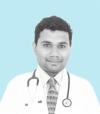What Does This Health Check Up Report Showing Elevated Cholesterol Indicate?

Cholesterol is the only issue, ignore the Protein
Detailed Answer:
Hello! Thanks for coming to HealthCareMagic.
I've gone through all 9 pages of your report. The only results that are of concern are the ones related to your cholesterol. your cholesterol levels are MILDLY elevated and I think that at age 33, these numbers should be lower to prevent the development of heart disease.
The best thing you can do now is manage your cholesterol through lifestyle modification.
1. Lose weight
Carrying some extra pounds — even just a few — contributes to high cholesterol. Losing as little as 5 to 10 percent of your body weight can help significantly reduce cholesterol levels.
2. Eat heart-healthy foods
Choose healthier fats. Saturated fats, found in red meat and dairy products, raise your total cholesterol and low-density lipoprotein (LDL) cholesterol, the "bad" cholesterol. As a general rule, you should get less than 7 percent of your daily calories from saturated fat. Instead, choose leaner cuts of meat, low-fat dairy and monounsaturated fats — found in olive, peanut and canola oils — for a healthier option.
Eliminate trans fats. Trans fat can be found in fried foods and many commercial baked products, such as cookies, crackers and snack cakes. But don't rely on packages that are labeled "trans fat-free."
3. Exercise on most days of the week
Whether you're overweight or not, exercise can reduce cholesterol. Better yet, moderate physical activity can help raise high-density lipoprotein (HDL) cholesterol, the "good" cholesterol. With your doctor's OK, work up to at least 30 minutes of exercise a day. Remember that adding physical activity, even in 10-minute intervals several times a day, can help you begin to lose weight. Just be sure that you can keep up the changes you decide to make. Consider:
Taking a brisk daily walk during your lunch hour
Riding your bike to work
Swimming laps
Playing a favorite sport
4. Quit smoking
If you smoke, stop.
5. Drink alcohol only in moderation
Moderate use of alcohol has been linked with higher levels of HDL cholesterol — but the benefits aren't strong enough to recommend alcohol for anyone who doesn't already drink. If you choose to drink alcohol, do so in moderation. For healthy adults, that means up to one drink a day for women of all ages and men older than age 65, and up to two drinks a day for men age 65 and younger.
I hope this helps. Feel free to follow-up
Vinay
Answered by

Get personalised answers from verified doctor in minutes across 80+ specialties



